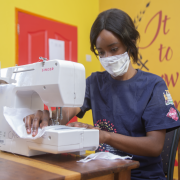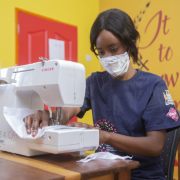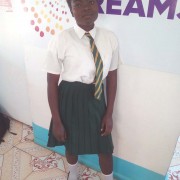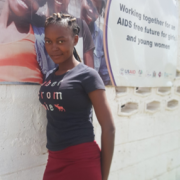Speeches Shim

LUSAKA – In five provinces across 40 sites, 240 young Zambian women are using their sewing skills to make face masks in response to COVID-19. These young women are members of the U.S. government’s Determined, Resilient, Empowered, AIDS free, Mentored, and Safe (DREAMS) Kozo Initiative. Originally trained to sew reusable menstrual hygiene products, the Kozo girls began sewing cloth face masks within weeks of the government’s mandate to wear masks in public spaces in response to the growing demand from their communities.

Across the country, Zambians are taking steps to protect themselves and their communities from the threat of COVID-19. From minimizing the number of trips they take to shops and increasing the frequency of hand washing to wearing cloth masks in public spaces, Zambians are shifting their behavior in response to the new global reality.
Yet for some, taking steps to protect themselves presents challenges. In the case of cloth masks, there is the cost to consider, and some can’t afford to buy them. So to help their community stay safe, the young women who are part of the Determined, Resilient, Empowered, AIDS free, Mentored, and Safe (DREAMS) Kozo Initiative have decided to take action.
LUSAKA – The United States joins the Zambian government and the global community in commemorating World Malaria Day 2020. The U.S. President’s Malaria Initiative (PMI), the U.S. Agency for International Development, and the Centers for Disease Control and Prevention lead the U.S. government’s malaria response initiatives in Zambia.

When Camira was young, she lost both of her parents to an unknown illness and was sent to live with her uncle and aunt. Over the years, her childhood was characterized by ill-health and a disrupted education. In 2016, at the age of 16, Camira met a Mentor from the PEPFAR Determined, Resilient, Empowered, Aids-free, Mentored and Safe (DREAMS) program. She was encouraged to join a DREAMS “Safe Space” and, under the guidance of a trained Mentor, Camira completed a 13 week curriculum of classes wh covered topics such as communication in relationships, HIV prevention, family planning, and financial literacy.

After Cecilia’s father died, her stepfather reluctantly agreed to pay her school fees. In grade 9, after failing a subject, he told her that her education was a ‘waste of money’. Without his financial support, Cecilia could no longer afford to go to school. Soon after, she left school and became pregnant with her first child.

Comment
Make a general inquiry or suggest an improvement.